3
1
I have a HP Pavillion dv6-6123cl Entertainment PC with a locked bios. I use a program called K10Stat in order to get around this and overclock anyway. I have AMD A6-3400 APU with Radeon(tm) HD Graphics. I did some testing and was able to benchmark my core to a max of 3.1 ghz, and 2.15 (with the previous value as boost) for a more thermally stable setup.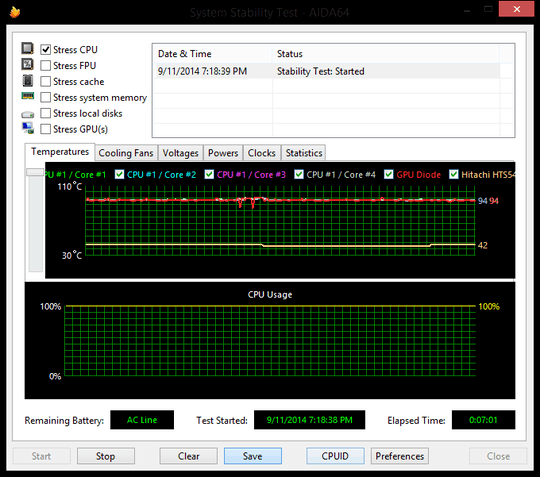
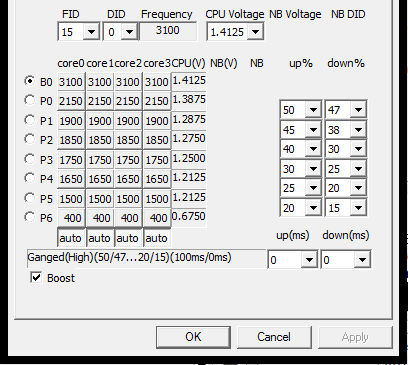
When I run a specific cpu intensive game, my cpu becomes 'stuck' at 1.89ghz either though the core load is 100% and even more strangely, overheats the computer components to > 115 C (Which triggers bios shutdown), either though it isn't at full speed. When the cpu is doing other things at 2.15 Ghz, the computer runs fine (such as in the benchmark picture where the core is at 100% utilization and max frequency). Why isn't the cpu:
- Using full capacity?
- Having thermal fluctuations when 'stuck' at a lowered frequency value while being completely stable at 94C when at full capacity (2.15ghz)
EDIT: OCCT, another benchmarking software yielded some interesting results:
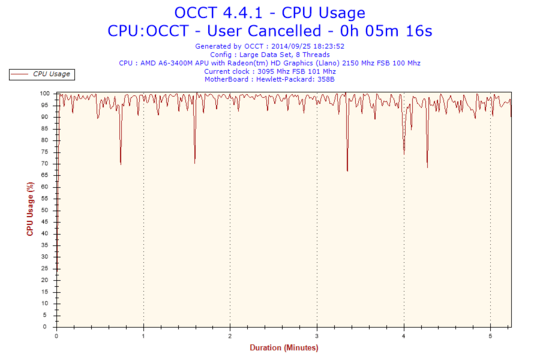
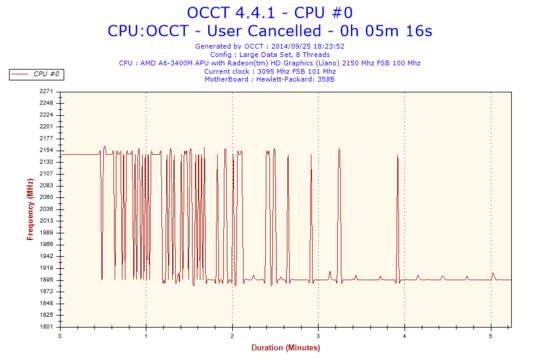
You can see here that the frequency starts out at the desired max frequency, but begins to drop more and more towards 1.89 ghz as the benchmark goes on.
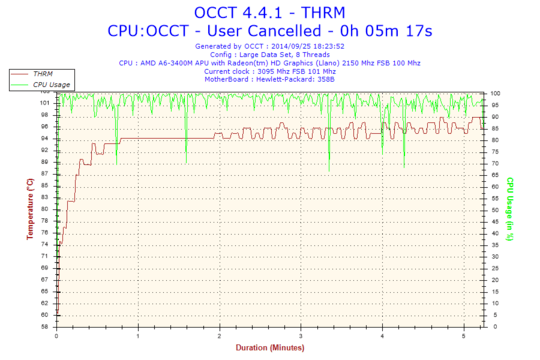
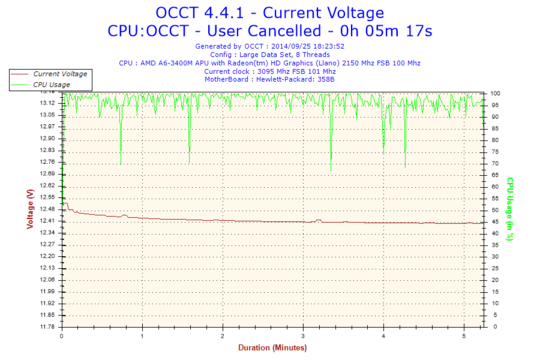
Interesting enough it appears that the Voltage slowly decreased and the thermals raised up whenever the cpu became 'stuck' at 1.89ghz. You can see the clearly benchmarked 94 degrees I described seeing when maxed out at 2.15 ghz, before the 1.89ghz temperature fluctuation stage begins to come into play.
Also the software appears to read my 'original' cpu speed as my new overclocked value instead of the cpu stock value of 1.4ghz.
My guess is that your benchmark is bad and doesn't max out the CPU. I suggest you try the program called "OCCT" (I'm on mobile so no link, you'll have to google it) and see if it's CPU benchmark works better. – None – 2014-09-25T04:21:39.940
I'll try the OCCT program for more benchmarking accuracy, but it still doesn't explain why the cpu gets stuck on 1.89ghz. – Bennett Yeo – 2014-09-25T22:06:59.387
The OCCT yielded some very interesting results. My hypothesis right now is that the computer is having trouble maintaining the correct voltage due to some unknown. – Bennett Yeo – 2014-09-25T23:37:27.233
are you concerned about the 12v decaying over time ? That's nothing, as long as it doesn't go below 12v or fluctuate extremely like jumping from 12v to 13v instantly. – None – 2014-09-26T04:15:14.557
No, I'm just very confused with the 1.89 frequency glitch – Bennett Yeo – 2014-09-27T02:39:48.470
94°C is a quite critical temperature, I wouldn't be surprised if some thermal protection was lowering the frequency. Also note that while the CPU may be at 94C, some other components (chipset, northbridge, etc) may be much hotter and their thermal protection was kicking in as well. – None – 2014-09-27T08:37:15.570
I'm suspecting 'AMD cool and quiet' might be kicking in, but if there is some protection kicking in, all it seems to be doing is causing even more thermal issues by causing that sticky 1.89 ghz. Once the stickiness occurs, if I switch to other overclock profiles, it gets stuck sometimes at even lower frequencies, but always causing thermal fluctuations. When I allow the laptop time to 'cool', it is able to get to its max frequency before returning to stickiness. Also, I can assure you all components that allow thermal measurement are exactly at 94C before the sticky frequency issues. – Bennett Yeo – 2014-09-27T17:21:55.810